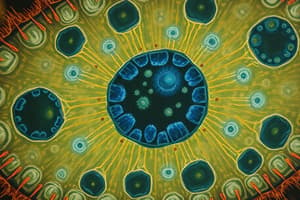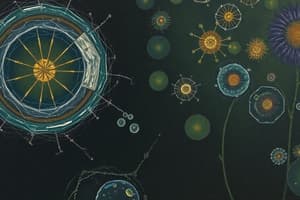Podcast
Questions and Answers
What unique functions can plants perform due to their characteristics?
What unique functions can plants perform due to their characteristics?
- Carbon fixation and nutrient uptake (correct)
- Reproduction and locomotion
- Photosynthesis and muscle contraction
- Respiration and excretion
What organelle, commonly found in animal cells, is notably absent in plant cells?
What organelle, commonly found in animal cells, is notably absent in plant cells?
- Mitochondria
- Nucleus
- Lysosomes (correct)
- Vacuole
Which cellular structure do animal cells rely on for mechanical support, unlike plant cells?
Which cellular structure do animal cells rely on for mechanical support, unlike plant cells?
- Chloroplast
- Cell wall
- Central vacuole
- Cytoskeleton (correct)
What function do lysosomes perform within animal cells?
What function do lysosomes perform within animal cells?
Understanding cell theory, plant cells, and animal cells forms the basis for comprehending what?
Understanding cell theory, plant cells, and animal cells forms the basis for comprehending what?
What is the main function of chloroplasts in plant cells?
What is the main function of chloroplasts in plant cells?
Which of the following is NOT a characteristic of cells according to cell theory?
Which of the following is NOT a characteristic of cells according to cell theory?
What distinguishes eukaryotic cells from prokaryotic cells?
What distinguishes eukaryotic cells from prokaryotic cells?
What is the primary function of the cell wall in plant cells?
What is the primary function of the cell wall in plant cells?
Which organelle is responsible for the synthesis of proteins in a cell?
Which organelle is responsible for the synthesis of proteins in a cell?
Flashcards are hidden until you start studying
Study Notes
Biology
Biology is a vast field of study that encompasses various aspects of life, including cellular processes, genetic inheritance, evolutionary history, and interactions between species within ecosystems. Biology seeks to explain the complexities of living systems through observation, experimentation, and theory development. Three essential components of biology are cell theory, plant cells, and animal cells. These subtopics provide foundational knowledge in understanding the fundamental biological principles that govern the functioning of life.
Cell Theory
Cell theory is a central principle in biology that states that all living things are composed of one or more cells, and that the cell is the basic unit of life. Cells are capable of self-maintenance, growth, reproduction, and response to stimuli. They contain a hereditary material, known as DNA, which instructs the synthesis of proteins required for essential functions. The cell theory has been refined over time, leading to two modern variants: prokaryotic and eukaryotic cell theories.
Plant Cells
Plant cells are specialized eukaryotic cells characterized by distinct features such as a rigid cell wall, chloroplasts containing chlorophyll, and large vacuoles. The cell wall provides structural stability and protection, while chloroplasts are responsible for photosynthesis, converting sunlight into chemical energy stored in glucose molecules. These characteristics enable plants to perform unique functions, such as carbon fixation and nutrient uptake.
Animal Cells
Animal cells, also called eukaryotic cells, share common characteristics with plant cells, such as a nucleus and membrane-bound organelles. However, animal cells lack cell walls and instead rely on a cytoskeleton made up of actin filaments and intermediate filaments for mechanical support. Another notable feature is the presence of lysosomes, which function in breaking down waste materials within the cell.
Exploring these subtopics further reveals intricate details about how life operates at the most basic level—the cell. Understanding the concepts of cell theory, plant cells, and animal cells forms the basis for comprehending higher-level biological phenomena, enabling researchers to investigate diseases, develop treatments, and ultimately enhance our lives.
Studying That Suits You
Use AI to generate personalized quizzes and flashcards to suit your learning preferences.




